Fleurs du Mal Magazine


Or see the index
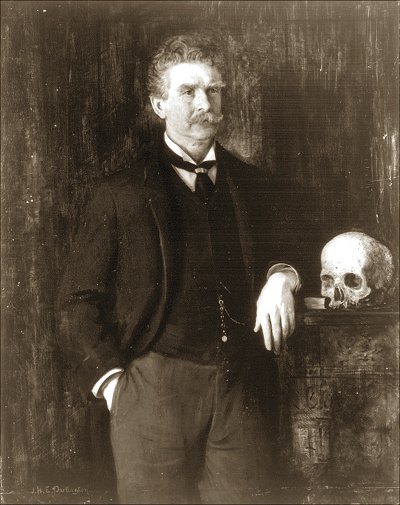
Ambrose Bierce
(1842-1914?)
A Commuted Sentence
Boruck and Waterman upon their grills
In Hades lay, with many a sigh and groan,
Hotly disputing, for each swore his own
Were clearly keener than the other’s ills.
And, truly, each had much to boast of–bone
And sinew, muscle, tallow, nerve and skin,
Blood in the vein and marrow in the shin,
Teeth, eyes and other organs (for the soul
Has all of these and even a wagging chin)
Blazing and coruscating like a coal!
For Lower Sacramento, you remember,
Has trying weather, even in mid-December.
Now this occurred in the far future. All
Mankind had been a million ages dead,
And each to her reward above had sped,
Each to his punishment below,–I call
That quite a just arrangement. As I said,
Boruck and Waterman in warmest pain
Crackled and sizzed with all their might and main.
For, when on earth, they’d freed a scurvy host
Of crooks from the State prison, who again
Had robbed and ravaged the Pacific Coast
And (such the felon’s predatory nature)
Even got themselves into the Legislature.
So Waterman and Boruck lay and roared
In Hades. It is true all other males
Felt the like flames and uttered equal wails,
But did not suffer them; whereas they bored
Each one the other. But indeed my tale’s
Not getting on at all. They lay and browned
Till Boruck (who long since his teeth had ground
Away and spoke Gum Arabic and made
Stump speeches even in praying) looked around
And said to Bob’s incinerated shade:
“Your Excellency, this is mighty hard on
The inventors of the unpardonable pardon.”
The other soul–his right hand all aflame,
For ’twas with that he’d chiefly sinned, although
His tongue, too, like a wick was working woe
To the reserve of tallow in his frame–
Said, with a sputtering, uncertain flow,
And with a gesture like a shaken torch:
“Yes, but I’m sure we’ll not much longer scorch.
Although this climate is not good for Hope,
Whose joyous wing ‘twould singe, I think the porch
Of Hell we’ll quit with a pacific slope.
Last century I signified repentance
And asked for commutation of our sentence.”
Even as he spoke, the form of Satan loomed
In sight, all crimson with reflections’s fire,
Like some tall tower or cathedral spire
Touched by the dawn while all the earth is gloomed
In mists and shadows of the night time. “Sire,”
Said Waterman, his agitable wick
Still sputtering, “what calls you back so quick?
It scarcely was a century ago
You left us.” “I have come to bring,” said Nick,
“St. Peter’s answer (he is never slow
In correspondence) to your application
For pardon–pardon me!–for commutation.
“He says that he’s instructed to reply
(And he has so instructed me) that sin
Like yours–and this poor gentleman’s who’s in
For bad advice to you–comes rather high;
But since, apparently, you both begin
To feel some pious promptings to the right,
And fain would turn your faces to the light,
Eternity seems all too long a term.
So ’tis commuted to one-half. I’m quite
Prepared, when that expires, to free the worm
And quench the fire.” And, civilly retreating,
He left them holding their protracted meeting.
.jpg)
Ambrose Bierce poetry
fleursdumal.nl magazine
More in: Archive A-B, Bierce, Ambrose

Heilloos verlangen
door Kees Godefrooij
Om meer te doen dan louter liggen staren
om vat te krijgen op dit tijdsgewricht
leg ik wat woorden vast in een gedicht
als poging om de onlust te verklaren
maar leven in een vers stuit op bezwaren
vandaar dat ik mij anderszins verplicht
en mee zal trekken met het wijkend licht
tot in de eeuw van de Salons, de jaren
waarin blank marmer onbeschaamd zou stoeien
met de bronzen gloed van de Romantiek
en rechters zich met B* zouden bemoeien
vanwege zijn onkuise symboliek
een eeuw waarin de kunsten konden bloeien
en ik, die alsmaar zweef op haar thermiek
B* = Charles Baudelaire, tegen wie een proces werd aangespannen vanwege aanstootgevende gedichten.
Kees Godefrooij (Rotterdam 1951) laat zich inspireren door de kunst van de Antieken, de Italiaanse Renaissance, de literatuur van de Zwarte Romantiek en hedendaagse voorvallen. Hij heeft een voorkeur voor de vorm van het sonnet hoewel hij het vrije vers niet afwijst. Godefrooij woonde ondermeer in Kopenhagen en Barcelona en begon op latere leeftijd met een studie cultuurwetenschappen. Het was tijdens de studie dat hij de poëzie ontdekte van ondermeer Baudelaire en Rilke. Vijftien jaar geleden begon hij gedichten te schrijven, zijn poëzie verscheen op diverse plekken, in druk als wel op het internet. In eigen beheer zijn er inmiddels zes bundels verschenen.
kempis poetry magazine
More in: Godefrooij, Kees
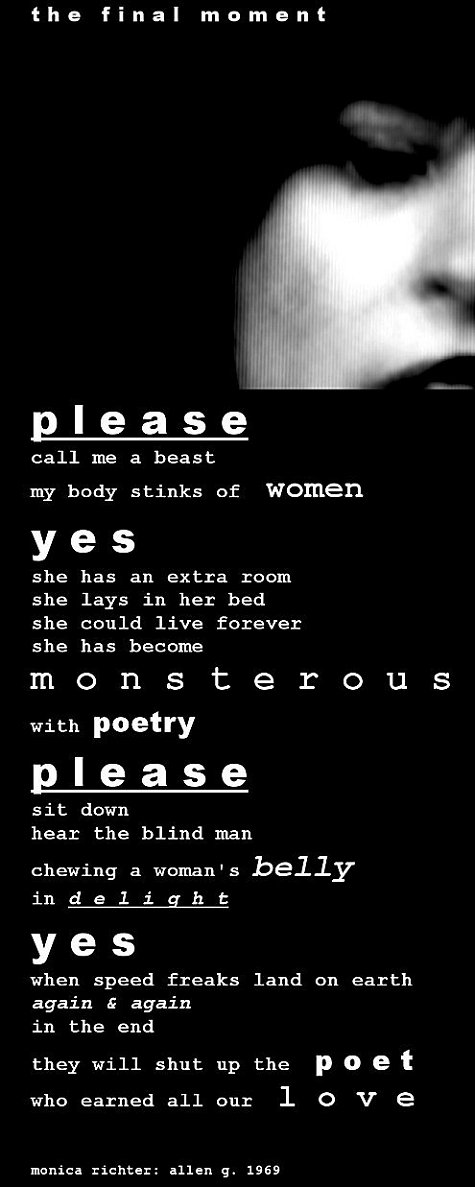
monica richter: the final moment – allen g. 1969
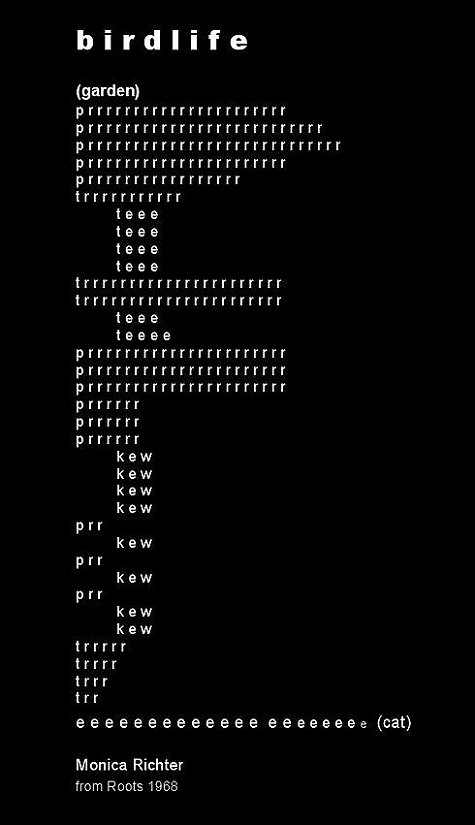
monica richter: birdlife from roots 1968

monica richter: das einfache mädchen – franz k. 1963
Monica Richter poetry – kempis poetry magazine
More in: *Concrete + Visual Poetry P-T, FLUXUS LEGACY, Monica Richter, Richter, Monica, Visual & Concrete Poetry
.jpg)
Emily Dickinson
(1830-1886)
T h e W i n d
Of all the sounds despatched abroad,
There’s not a charge to me
Like that old measure in the boughs,
That phraseless melody
The wind does, working like a hand
Whose fingers brush the sky,
Then quiver down, with tufts of tune
Permitted gods and me.
When winds go round and round in bands,
And thrum upon the door,
And birds take places overhead,
To bear them orchestra,
I crave him grace, of summer boughs,
If such an outcast be,
He never heard that fleshless chant
Rise solemn in the tree,
As if some caravan of sound
On deserts, in the sky,
Had broken rank,
Then knit, and passed
In seamless company.
.jpg)
Emily Dickinson poetry
k e m p i s p o e t r y m a g a z i n e
More in: Dickinson, Emily
![]()
William Henry Drummond
(1854 – 1907)
Madeleine Vercheres
I’ve told you many a tale, my child, of the old heroic days
Of Indian wars and massacre, of villages ablaze
With savage torch, from Ville Marie to the Mission of Trois Rivieres
But never have I told you yet, of Madeleine Vercheres.
Summer had come with its blossoms, and gaily the robin sang
And deep in the forest arches the axe of the woodman rang
Again in the waving meadows, the sun-browned farmers met
And out on the green St. Lawrence, the fisherman spread his net.
And so through the pleasant season, till the days of October came
When children wrought their parents, and even the old and lame
With tottering frames and footsteps, their feeble labors lent
At the gathering of the harvest le bon Dieu himself had sent.
For news there was none of battle, from the forts on the Richelieu
To the gates of the ancient city, where the flag of King Louis flew
All peaceful the skies hung over the seignerie of Vercheres,
Like the calm that so often cometh, ere the hurricanes rends the air.
And never a thought of danger had the Seigneur sailing away,
To join the soldiers of Carignan, where down at Quebec they lay,
But smiled on his little daughter, the maiden Madeleine,
And a necklet of jewels promised her, when home he should come again.
And ever the days passed swiftly, and careless the workmen grew
For the months they seemed a hundred, since the last war-bugle blew.
Ah! little they dreamt on their pillows, the farmers of Vercheres,
That the wolves of the southern forest had scented the harvest fair.
Like ravens they quickly gather, like tigers they watch their prey
Poor people! with hearts so happy, they sang as they toiled away.
Till the murderous eyeballs glistened, and the tomahawk leaped out
And the banks on the green St. Lawrence echoed the savage shout.
“Oh mother of Christ have pity,” shrieked the women in despair
“This is no time for praying,” cried the young Madeleine Vercheres,
“Aux armes! aux armes! les Iroquois! quick to your arms and guns
Fight for your God and country and the lives of the inocent ones.”
And she sped like a deer of the mountain, when beagles press close behind
And the feet that would follow after, must be swift as the prairie wind.
Alas! for the men and women, and litle ones that day
For the road it was long and weary, and the fort it was far away.
But the fawn had outstripped the hunters, and the palisades drew near,
And soon from the inner gateway the war, bugle rang out clear;
Gallant and clear it sounded, with never a note of despair
‘T was a soldier of France’s challenge, from the young Madeleine Vercheres.
“And this is my little garrison, my brothers Louis and Paul?
With soldiers two, and a cripple? may the Virgin pray for us all.
But we’ve powder and guns in plenty, and we ‘ll fight to the latest breath
And if need be for God and country, die a brave soldier’s death.
“Load all the carabines quickly, and whenever you sight the foe
Fire from the upper turret, and the loopholes down below.
Keep up the fire, brave soldiers, though the fight may be fierce and long
And they ‘ll think out little garrison is more than a hundred strong.”
So spake the maiden Madeleine, and she roused the Norman blood
That seemed for a moment sleeping, and sent it like a flood
Though every heart around her, and they fought the red Iroquois
As fought in the old time battles, the soldiers of Carignan.
And they say the black clouds gathered, and a tempest swept the sky
And the roar of the thunder mingled with the forest tiger’s cry
But still the garrison fought on, while the lightning’s jagged spear
Tore a hole in the night’s dark curtain, and showed them a foeman near.
And the sun rose up in the morning, and the color of blood was he
Gazing down from the heavens on the little company.
“Behold! my friend!” cried the maiden,” ‘t is a warning lest we forget
Though the night saw us do our duty, our work is not finished yet.”
And six days followed each other, and feeble her limbs became
Yet the maid never sought her pillow, and the flash of the carabines’ flames
Illuminated the powder-smoked face, aye, even when hope seemed gone
And she only smiled on her comrades, and told them to fight, fight on.
And she blew a blast on the bugle, and lo! from the forest black
Merrily, merrily ringing, an answer came pealing back
Oh! pleasant and sweet it sounded, borne on the morning air,
For it heralded fifty soldiers, with gallant De la Monniere.
And when he beheld the maiden, the soldier of Carignan,
And looked on the little garrison that fought the red Iroquois
And held their own in the battle, for six long weary days,
He stood for a moment speechless, and marvelled at woman’s ways.
Then he beckoned the men behind him and steadily they advance
And with carabines uplifted, the veterans of France
Saluted the brave young captain so timidly standing there
And they fired a volley in honor of Madeleine Vercheres.
And this, my dear, is the story of the maiden Madeleine
God grant that we in Canada may never see again
Such cruel wars and massacres, in waking or in dream
As our fathers and mothers saw, my child, in the days of the old regime.
William Henry Drummond poetry
kempis poetry magazine
More in: Archive C-D
.jpg)
P. A. d e G é n e s t e t
(1829 – 1861)
M o e d e r s G r a f
Wel hem, wien God in ’t vluchtig leven
Een vrome moeder heeft gegeven,
Want wie kan twijflen op haar graf?
v. d. HOEVEN Jr. naar LAMARTINE
Waar rijst, uit twijfel, zonde en smart,
Altijd, met diep gelooven,
Een ongeloovig menschenhart
Weer stille en rein, naar boven?
’t Is bij het graf der vrome vrouw,
Die ’t eerst ons hart bewaarde!
Begraaft gij uwer moeder trouw
Toch met geen handvol aarde.
Daar kan geen twijfel, die verleidt,
Des harten drang verhinderen
Het kinderoog ziet de eeuwigheid
En mannen worden kinderen.
1857
.jpg) +
+
P. A. de Génestet gedichten
k e m p i s p o e t r y m a g a z i n e
More in: Génestet, P.A. de
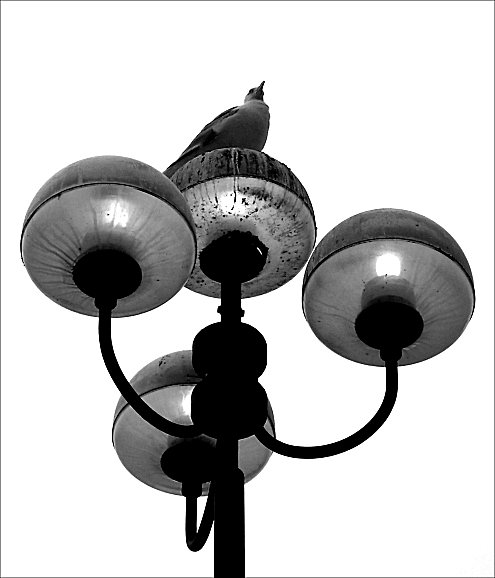
jef van kempen: landscape 52
fleursdumal.nl magazine
More in: Jef van Kempen, Jef van Kempen Photos & Drawings, Kempen, Jef van, Spurensicherung
.jpg)
William Shakespeare
(1564-1616)
THE SONNETS
34
Why didst thou promise such a beauteous day,
And make me travel forth without my cloak,
To let base clouds o’ertake me in my way,
Hiding thy brav’ry in their rotten smoke?
‘Tis not enough that through the cloud thou break,
To dry the rain on my storm-beaten face,
For no man well of such a salve can speak,
That heals the wound, and cures not the disgrace:
Nor can thy shame give physic to my grief,
Though thou repent, yet I have still the loss,
Th’ offender’s sorrow lends but weak relief
To him that bears the strong offence’s cross.
Ah but those tears are pearl which thy love sheds,
And they are rich, and ransom all ill deeds.
![]()
kempis poetry magazine
More in: -Shakespeare Sonnets
.jpg)
R o b e r t B r o w n i n g
(1812-1889)
A F a c e
If one could have that little head of hers
Painted upon a background of pale gold,
Such as the Tuscan’s early art prefers!
No shade encroaching on the matchless mold
Of those two lips, which should be opening soft
In the pure profile; not as when she laughs,
For that spoils all; but rather as if aloft
Yon hyacinth, she loves so, leaned its staff’s
Burthen of honey-colored buds to kiss
And capture ‘twixt the lips apart for this.
Then her lithe neck, three fingers might surround,
How it should waver on the pale gold ground
Up to the fruit-shaped, perfect chin it lifts!
I know, Correggio loves to mass, in rifts
Of heaven, his angel faces, orb on orb
Breaking its outline, burning shades absorb;
But these are only massed there, I should think,
Waiting to see some wonder momently
Grow out, stand full, fade slow against the sky
(That’s the pale ground you’d see this sweet face by),
All heaven, meanwhile, condensed into one eye
Which fears to lose the wonder, should it wink.
.jpg)
Robert Browning poetry
k e m p i s p o e t r y m a g a z i n e
More in: Browning, Robert
.jpg)
W i l l e m B i l d e r d i j k
(1756-1831)
D e w a e r e l d
Wat zijt ge, ô samenstel van onbegrijplijkheden?
ô Schaakling van gewrocht en oorzaak zonder end?
Wier mooglijkheid de geest te naauwernood rekent;
Wier dadelijk bestaan een nacht is voor de reden!
ô Afgrond! dien ’t besef geen weg windt in te treden!
Wat zijt ge? Een bloote schijn, het zintuig ingeprent?
Een indruk van ’t verstand, waarom ’t zich vruchtloos wendt?
Een denkbeeld, dat we ons zelf uit ijdle meening smeden?
Of zijt ge in tegendeel een wezen buiten my?
Bestaat ge? is dat bestaan geen enkle droomery?
Of is ’t een wijziging van eenig ander wezen?
Dus vraagde ik reis op reis, tot God my ’t andwoord gaf.
Hy sprak: ’t bestaan is ’t mijn’; wat is, hangt van my af,
De Waereld is mijn stem, en roept u, my te vreezen.
.jpg)
Willem Bilderdijk gedichten
kempis poetry magazine
More in: Bilderdijk, Willem
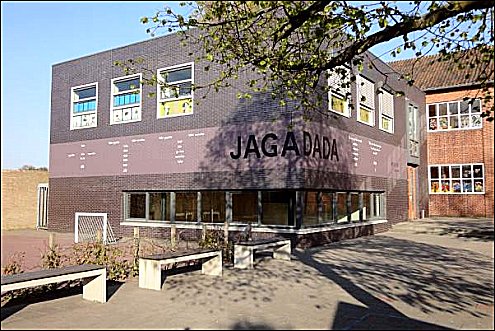
Foto Ed Visser
PROJECT MUURGEDICHTEN LEIDEN
Openbare Basisschool De Morskring
Damlaan 1 – 2332 XG Leiden
In april 2010 is het muurgedicht Jagadada van Antony Kok, dat met de sloop van de gymzaal van Basisschool De Morskring in Leiden in de zomer van 2004 is verdwenen, opnieuw aangebracht.
Voor informatie zie website: Muurgedichten Leiden
Antony Kok (1882 – 1969) – gedicht Jagadada 1923
.jpg)
fleursdumal magazine
More in: Antony Kok, Antony Kok, Kok, Antony, Street Art, Urban Art
.jpg)
Amy Levy
(1861-1889)
A London Plane-Tree
Green is the plane-tree in the square,
The other trees are brown;
They droop and pine for country air;
The plane-tree loves the town.
Here from my garret-pane, I mark
The plane-tree bud and blow,
Shed her recuperative bark,
And spread her shade below.
Among her branches, in and out,
The city breezes play;
The dun fog wraps her round about;
Above, the smoke curls grey.
Others the country take for choice,
And hold the town in scorn;
But she has listened to the voice
On city breezes borne.
Amy Levy poetry
fleursdumal.nl magazine
Thank you for reading Fleurs du Mal - magazine for art & literature